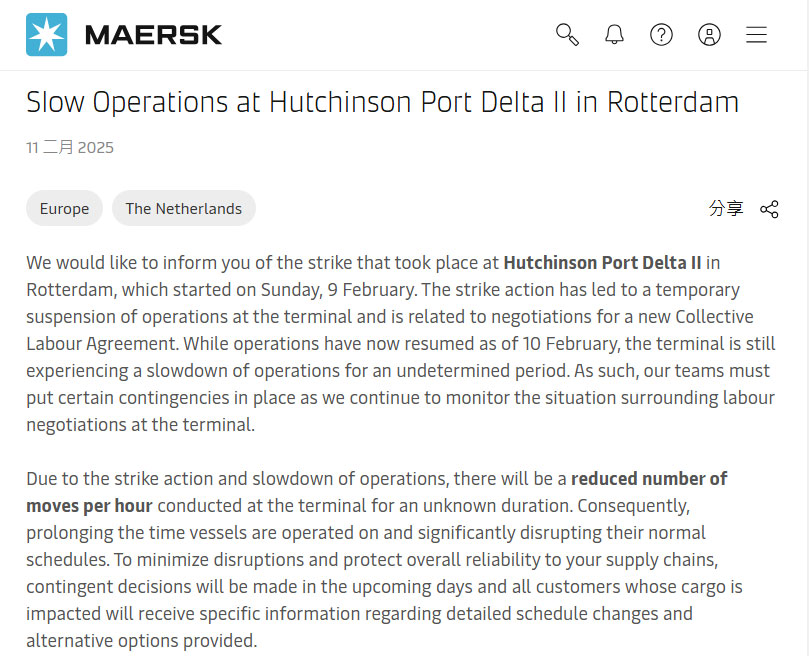

This port delay in Europe, Maersk alert
Belgium is facing a nationwide general strike on February 13, severely affecting public services such as flights, ports, buses, railways, postal services, schools and health services across the country. It is reported that Belgium's main trade unions plan to mobilize 60,000 people in Brussels on the day of protest demonstrations, the parade route will be extended from Brussels train station north to train station south.
In terms of air transport, the strike caused all airports in Belgium, including Brussels Airport and Brussels Spratly Leroi Airport, to cancel all outbound flights for the day. At the same time, inbound flights have also been severely affected, forced to cancel or adjust. The participation of air traffic control departments has put air transport in a complete grounding predicament.
Rail and public transport systems were also not spared. The strike caused severe disruptions to rail and bus systems across the country, with some services being disrupted or adjusted. The union also announced that it will launch a nine-day rail strike from February 21 to 28, which will undoubtedly further impact the normal operation of domestic and cross-border rail transport. In addition, the union also plans to repeat the national strike on the 13th of each month, which may have a cyclical impact and cast a shadow over the future operation of the public transport system.
In the field of port freight, the strike has also caused a big impact. Major Belgian ports, such as the Port of Antwerp, are facing operational disruptions and cargo delays. Inchcape, a shipping service, warned that the strike could lead to a significant reduction in the efficiency of port operations, further aggravating logistics pressures. At the same time, other European ports such as Rotterdam also experienced strikes or congestion problems during the same period, which further increased the pressure on the regional supply chain.
Maersk's official website recently issued a number of customer notices, warning of congestion in a number of ports. Among them, on February 9, a strike occurred at the Hutchinson Port Delta II terminal in the Port of Rotterdam in the Netherlands, causing the terminal to temporarily stop operations, although business has resumed on February 10, but it is still slowing down, and vessels are operating longer hours, seriously disrupting the normal schedule.
At the same time, Maersk also noted that due to long waiting times for ships in Shanghai, Ningbo and Singapore, routes from Far East Asia were also experiencing delays. Ships originally scheduled to arrive on Thursday are now not expected to dock until later on Friday, and the estimated time of Arrival (ETA) will be further adjusted, potentially delaying the discharge of imported cargoes as well.
In order to alleviate the port congestion problem, Maersk will take a series of measures, including route adjustments. This week, Maersk will make adjustments to some berths, sailing AND arrival times on the MASHARIKI route and adopt a "CUT AND RUN" strategy, which means leaving the port earlier than planned to meet the transshipment deadline.
According to data provided by the liner database EESEA, the ports of Mombasa, Dar es Salaam, Shanghai, Ningbo and Singapore have been severely affected, with the number of vessels at anchor and waiting to enter the port remaining high, highlighting the current severe situation of port congestion.
The national strike in Belgium and port congestion around the world have had a serious impact on logistics. Shipping giants such as Maersk are scrambling to respond, taking several measures to ease congestion and alert customers to the changes so that cargoes can be loaded and transported smoothly.

In terms of air transport, the strike caused all airports in Belgium, including Brussels Airport and Brussels Spratly Leroi Airport, to cancel all outbound flights for the day. At the same time, inbound flights have also been severely affected, forced to cancel or adjust. The participation of air traffic control departments has put air transport in a complete grounding predicament.
Rail and public transport systems were also not spared. The strike caused severe disruptions to rail and bus systems across the country, with some services being disrupted or adjusted. The union also announced that it will launch a nine-day rail strike from February 21 to 28, which will undoubtedly further impact the normal operation of domestic and cross-border rail transport. In addition, the union also plans to repeat the national strike on the 13th of each month, which may have a cyclical impact and cast a shadow over the future operation of the public transport system.
In the field of port freight, the strike has also caused a big impact. Major Belgian ports, such as the Port of Antwerp, are facing operational disruptions and cargo delays. Inchcape, a shipping service, warned that the strike could lead to a significant reduction in the efficiency of port operations, further aggravating logistics pressures. At the same time, other European ports such as Rotterdam also experienced strikes or congestion problems during the same period, which further increased the pressure on the regional supply chain.
Maersk's official website recently issued a number of customer notices, warning of congestion in a number of ports. Among them, on February 9, a strike occurred at the Hutchinson Port Delta II terminal in the Port of Rotterdam in the Netherlands, causing the terminal to temporarily stop operations, although business has resumed on February 10, but it is still slowing down, and vessels are operating longer hours, seriously disrupting the normal schedule.

At the same time, Maersk also noted that due to long waiting times for ships in Shanghai, Ningbo and Singapore, routes from Far East Asia were also experiencing delays. Ships originally scheduled to arrive on Thursday are now not expected to dock until later on Friday, and the estimated time of Arrival (ETA) will be further adjusted, potentially delaying the discharge of imported cargoes as well.
In order to alleviate the port congestion problem, Maersk will take a series of measures, including route adjustments. This week, Maersk will make adjustments to some berths, sailing AND arrival times on the MASHARIKI route and adopt a "CUT AND RUN" strategy, which means leaving the port earlier than planned to meet the transshipment deadline.
According to data provided by the liner database EESEA, the ports of Mombasa, Dar es Salaam, Shanghai, Ningbo and Singapore have been severely affected, with the number of vessels at anchor and waiting to enter the port remaining high, highlighting the current severe situation of port congestion.
The national strike in Belgium and port congestion around the world have had a serious impact on logistics. Shipping giants such as Maersk are scrambling to respond, taking several measures to ease congestion and alert customers to the changes so that cargoes can be loaded and transported smoothly.





